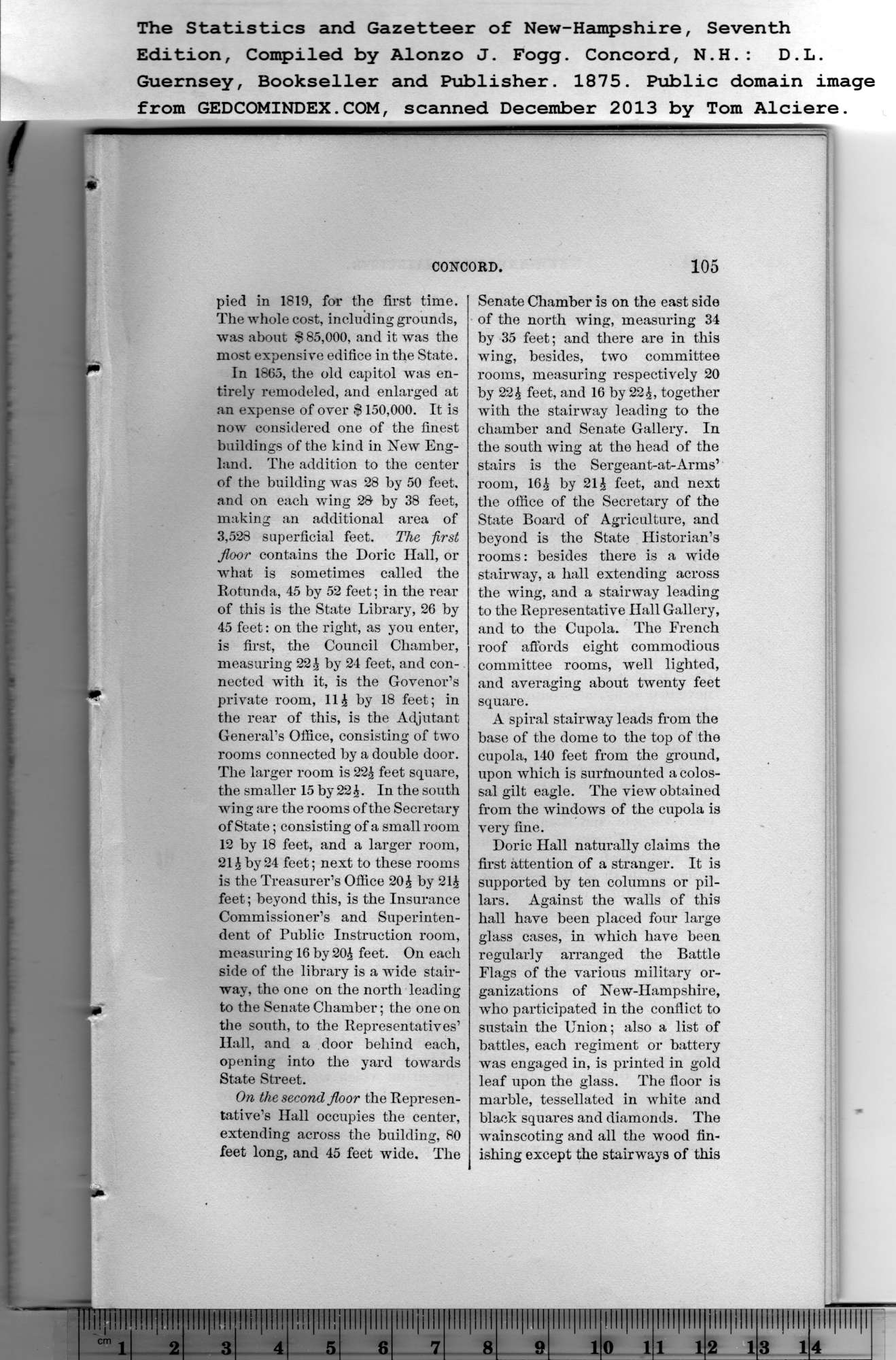|
pied in 1819, for the first time.
The whole cost, including grounds,
was about $ 85,000, and it was the
most expensive edifice in the State.
The Statistics and Gazetteer of New-Hampshire, Seventh
Edition, Compiled by Alonzo J. Fogg. Concord, N.H.: D.L.
CONCORD. 105
In 1865, the old capitol was en-
tirely remodeled, and enlarged at
an expense of over $ 150,000. It is
now considered one of the finest
buildings of the kind in New Eng-
land. The addition to the center
of the building was 28 by 50 feet,
and on each wing 28 by 38 feet,
making an additional area of
3,528 superficial feet. The first
floor contains the Doric Hall, or
what is sometimes called the
Rotunda, 45 by 52 feet; in the rear
of this is the State Library, 26 by
45 feet: on the right, as you enter,
is first, the Council Chamber,
measuring 22 i by 24 feet, and con-
nected with it, is the Govenor’s
private room, lli by 18 feet; in
the rear of this, is the Adjutant
General’s Office, consisting of two
rooms connected by a double door.
The larger room is 22i feet square,
the smaller 15 by 22 i. In the south
wing are the rooms of the Secretary
of State; consisting of a small room
12 by 18 feet, and a larger room,
21 iby24 feet; next to these rooms
is the Treasurer’s Office 20 i by 21£
feet; beyond this, is the Insurance
Commissioner’s and Superinten-
dent of Public Instruction room,
measuring 16 by 20i feet. On each
side of the library is a wide stair-
way, the one on the north leading
to the Senate Chamber; the one on
the south, to the Representatives’
Hall, and a door behind each,
opening into the yard towards
State Street.
On the second floor the Represen-
tative’s Hall occupies the center,
extending across the building, 80
feet long, and 45 feet wide. The |
Senate Chamber is on the east side
of the north wing, measuring 34
by 35 feet; and there are in this
wing, besides, two committee
rooms, measuring respectively 20
by 22i feet, and 16 by 22i, together
with the stairway leading to the
chamber and Senate Gallery. In
the south wing at the head of the
stairs is the Sergeant-at-Arms’
room, 16i by 21 i feet, and next
the office of the Secretary of the
State Board of Agriculture, and
beyond is the State Historian’s
rooms: besides there is a wide
stairway, a hall extending across
the wing, and a stairway leading
to the Representative Hall Gallery,
and to the Cupola. The French
roof affords eight commodious
committee rooms, well lighted,
and averaging about twenty feet
square.
A spiral stairway leads from the
base of the dome to the top of the
cupola, 140 feet from the ground,
upon which is surmounted a colos-
sal gilt eagle. The view obtained
from the windows of the cupola is
very fine.
Doric Hall naturally claims the
first attention of a stranger. It is
supported by ten columns or pil-
lars. Against the walls of this
hall have been placed four large
glass cases, in which have been
regularly arranged the Battle
Flags of the various military or-
ganizations of New-Hampshire,
who participated in the conflict to
sustain the Union; also a list of
battles, each regiment or battery
was engaged in, is printed in gold
leaf upon the glass. The floor is
marble, tessellated in white and
black squares and diamonds. The
wainscoting and all the wood fin-
ishing except the stairways of this |
